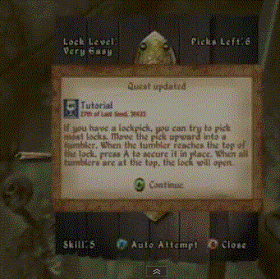Wasteland seems like a game I could grow to like once I get comfortable with it, but right now I'm in that angst-filled stage of gameplay where I don't know how everything works yet, and every time I leave an area, I feel like I missed something. As much as I like CRPGs, I hate this phase of playing CRPGs--when I'm just on the cusp of familiarity, yet something still seems elusive.
 Baldur's Gate gave you a nice, relaxing tutorial in which the monks taught you how to use the keyboard.
Baldur's Gate gave you a nice, relaxing tutorial in which the monks taught you how to use the keyboard.I suspect many other gamers feel similarly, because a somewhat standard feature in modern games is a limited introductory area combined with a tutorial. I don't know what game offered this first, but I first encountered it in Baldur's Gate and it was brilliant. There were a series of simple quests interspersed with characters who tutored you on how to use the interface. By the time you left Candlekeep, you could focus entirely on the story and gameplay. Neverwinter Nights, Oblivion, and Dragon Age: Origins are all recent games with good opening sections that ease you into the game world and interface.
In the pre-tutorial era, CRPGs had several other ways to get you going smoothly. One was by simply not being that hard to begin with. Anyone who sits down with Rogue for 10 minutes and then screams, "I just can't figure this game out!" probably shouldn't be at the computer at all. Another was to adopt conventions of other games; a Wizardry player doesn't have much difficulty figuring out The Bard's Tale. Certain series maintained consistency, and of course in the 1990s, you start to see commonalities in games that use the same engine. I don't think Icewind Dale had a tutorial, but most gamers were coming from Baldur's Gate and didn't need it.
This is why it can be so comfortable to slip into a D&D-derived game. You may not know the world, the quest, or the characters, but at least you know the rules. I can't remember the last time I fired up a D&D game and said to myself, "I wonder if the 'fireball' spell is going to be useful."
Of course, many early game developers relied on manuals to do the work of tutorials, and this is perhaps the least satisfying way to get involved in a game. I love the old game manuals for back story and descriptions of the world--I really need to do a posting on this--but not for descriptions of the interface. There's not much more painful than to read a description of a game screen you haven't even encountered yet.
 From the Pool of Radiance manual: Each menu command described in detail. Easier just to figure it out while playing.
From the Pool of Radiance manual: Each menu command described in detail. Easier just to figure it out while playing.Stephen King has a pretty good passage in Hearts in Atlantis in which an older character is giving advice to a kid about reading.
A book is like a pump. It gives nothing unless first you give to it. You prime a pump with your own water, you work the handle with your own strength. You do this because you expect to get back more than you give...eventually.
He recommends that the kid read the first 20 pages or something, and if by then it's just not flowing, put it aside and try something else. This was largely the purpose behind my six-hour rule. I figured it would stop me from discarding perfectly good games that just take a while to get into. It has, for the most part. But, for some reason, in 1988, I've been allowing myself the luxury of blowing past games that confound me--BattleTech, Sentinel Worlds, Star Command--with the result that I have a whole list of games I've kicked to the end of the 1988, and I now I have to put in some serious elbow grease.
It starts with Wasteland. I haven't played it all month, so I really need to just start over with a brand new set of characters, focus, and devote the time until it starts flowing on its own. I think I'll have enough by tomorrow for at least a short posting. In the meantime, for any of you who recognized the title of this posting from an old Ira Gershwin/Vernon Duke song (it's really worth downloading the Bunny Berigan and Anita O'Day versions), here's a verse I wrote just for you:
I've led the arls of Ferelden to war
A whole world calls me its avatar
With demon lords I've a-la-carted
Still I can't get started with you













